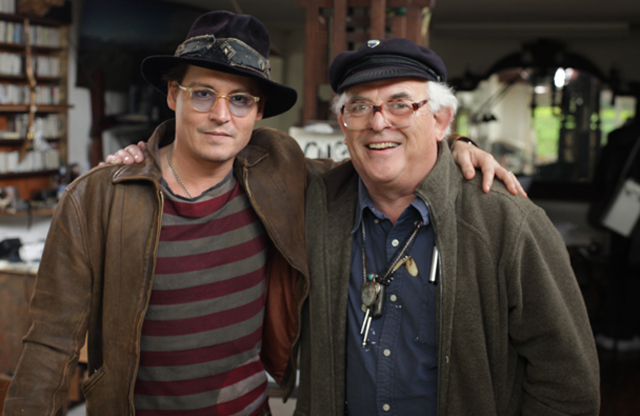CHICAGO – In anticipation of the scariest week of the year, HollywoodChicago.com launches its 2024 Movie Gifts series, which will suggest DVDs and collections for holiday giving.
Artist Ralph Steadman Profiled in ‘For No Good Reason’
 Rating: 3.5/5.0 |
CHICAGO – In the deluge of images that pierce our cerebral cortex on a daily basis, it’s refreshing to go back to the days when images had more influence, sought through publications or word of mouth. Artist Ralph Steadman was a mover and shaker – along with his writing partner Hunter S. Thompson – in the age-old notion that the pen can be mightier than the sword.
Steadman’s work is more well known than his name, because of his association with Hunter S. From his first wild illustrations in Thompson’s “Fear and Loathing in Las Vegas” to his editorial forays for Rolling Stone Magazine, Steadman has used his surrealist style to expose the madness of society and all of us. Director Charlie Paul provides an exacting history of Steadman, along with a profile of the artist today. What is most fascinating about the film is the artist-at-work – he uses a methodology that speaks volumes for his brand of creative freedom.
We meet Steadman in his studio, building upon a new work with his one-of-a-kind cartoon style technique. As the camera follows process on the canvas, the familiarity of what his drawings represent become clearer. One of the visitors to his studio is Johnny Depp, who has portrayed Thompson and is a student of the gonzo journalist. The story of Steadman, with and without Thompson, begins to unfold.

Going Gonzo: Classic Ralph Steadman Illustration in ‘For No Good Reason’
Photo credit: Sony Pictures Classics
Steadman began his career in printing in the late 1960s, but also broke in doing freelance work for publications as diverse as Punch, Rolling Stone Magazine and the New York Times. Through the Rolling Stone, he took up with Thompson, and was forever linked to the author through his unforgettable illustrations for the books, articles and even films based on Thompson’s “Raoul Duke” character. Beyond that, Steadman developed a reputation as a rabble rouser with his editorial cartoons, fighting the power “For No Good Reason.”
Charlie Paul creates a comprehensive documentary overview of Steadman and his work, using a variety of illustrative techniques including historical recreations, talking heads, archival footage and some animation of Steadman’s most famous works. All of these methods are effective, and breathes life into the form of this filmmaking, especially as it is a profile of an artist.
Another interesting element of the piece is Steadman’s radicalism. He is a perfect aging hippie bloke, who was more of an observer than a direct participant in the Thompson madness – although he did accompany the journalist to the Kentucky Derby, as part of a legendary article. Steadman is opinionated about the oppressive nature of the oligarchy, especially when it comes to their need to make war. This is almost defined by his unique style, the ink spatters and exaggerated human forms nearly screaming for a type of justice.
The art studio is the ground zero place where Steadman finds his muse. He famously does not discard any work – it becomes complete in some way – nor does he sell his originals. He is content today to be among his ink wells and paints, opining on his perspective through the familiar elements of his style. It becomes clear in this film why he and Thompson were destined to hook up, because sometimes the universe works in that perfect order.

Johnny Depp and Artist Ralph Steadman in ‘For No Good Reason’
Photo credit: Sony Pictures Classics
Less effective is the capitalistic nature of how Steadman makes his living. The prints of his work are still in demand, and there is ironic poignancy to his signing of print after print, complaining the whole way through. Depp hangs out at the studio, but doesn’t really offer anything except as a stoic representation of the Thompson legacy. He almost seems reluctant to be on camera.
The 1960s are long over, but its legacy still exists in the now-old influencers of that time. Steadman continues to hold the banner of anarchy high, and still wields that powerful pen to give notice that the slap of the artistic counter-punch can still reign supreme.
 | By PATRICK McDONALD |


